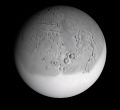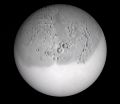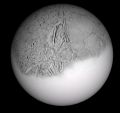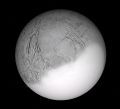Difference between revisions of "Enceladus"
Jump to navigation
Jump to search
(Added category.) |
(Added content.) |
||
| Line 14: | Line 14: | ||
!bgcolor="lightsteelblue" colspan="2"|Planetary mean orbits | !bgcolor="lightsteelblue" colspan="2"|Planetary mean orbits | ||
|- | |- | ||
| − | |width="30%"|Epoch||align="right" width="50%"| | + | |width="30%"|Epoch||align="right" width="50%"|2005.41409993155 |
|- | |- | ||
| − | |width="30%"|Semimajor axis (a)||align="right" width="50%"| | + | |width="30%"|Semimajor axis (a)||align="right" width="50%"|238408052.167797 m |
|- | |- | ||
| − | |width="30%"|Eccentricity (e)||align="right" width="30%"|0. | + | |width="30%"|Eccentricity (e)||align="right" width="30%"|0.000372459385461708 |
|- | |- | ||
| − | |width="30%"|Inclination (i)||align="right" width="30%"| | + | |width="30%"|Inclination (i)||align="right" width="30%"|28.04279097° <br> (0.489439033839462 radian) |
|- | |- | ||
| − | |width="30%"|Longitude of the ascending node (LAN, ☊)||align="right" width="30%"| | + | |width="30%"|Longitude of the ascending node (LAN, ☊)||align="right" width="30%"|169.5204865° <br> (2.95869063964615 radian) |
|- | |- | ||
| − | |width="30%"|Longitude of periapsis (ϖ)||align="right" width="30%"| | + | |width="30%"|Longitude of periapsis (ϖ)||align="right" width="30%"|264.6781976° <br> (4.6195060071305 radian) |
|- | |- | ||
| − | |width="30%"|Mean longitude (L)||align="right" width="30%"| | + | |width="30%"|Mean longitude (L)||align="right" width="30%"|384.1198896° <br> (6.70415679611494 radian) |
|- | |- | ||
!bgcolor="lightsteelblue" colspan="2"|Selected physical parameters | !bgcolor="lightsteelblue" colspan="2"|Selected physical parameters | ||
| Line 44: | Line 44: | ||
|width="30%"|LAN||align="right" width="30%"|6.09808 | |width="30%"|LAN||align="right" width="30%"|6.09808 | ||
|- | |- | ||
| − | |width="30%"|Note||align="right" width="30%"|*Elements given are from Enceladus.cfg ( | + | |width="30%"|Note||align="right" width="30%"|*Elements given are from Enceladus.cfg (Orbiter 2005) |
|} | |} | ||
| Line 58: | Line 58: | ||
|- | |- | ||
!Add-on!!Source!!Version!!Author!!Type!!Release Date!!Compatibility!!Wiki article | !Add-on!!Source!!Version!!Author!!Type!!Release Date!!Compatibility!!Wiki article | ||
| + | |- | ||
| + | |[https://www.orbiter-forum.com/resources/2005-with-p1-patch-files.5432/ 2005 (with P1 patch files)]||O-F Resources||050216||martins||Orbiter Download||16 February 2005||Orbiter 2005|| | ||
|- | |- | ||
|[https://www.orbiter-forum.com/resources/orbiter-2003-p2.5433/ Orbiter 2003-P2]||O-F Resources||031217||martins||Orbiter Download||17 December 2003||Orbiter 2003-P2|| | |[https://www.orbiter-forum.com/resources/orbiter-2003-p2.5433/ Orbiter 2003-P2]||O-F Resources||031217||martins||Orbiter Download||17 December 2003||Orbiter 2003-P2|| | ||
| Line 75: | Line 77: | ||
Enceladus-orbiter2002p3.jpg|<center>Enceladus in Orbiter 2002P3</center> | Enceladus-orbiter2002p3.jpg|<center>Enceladus in Orbiter 2002P3</center> | ||
Enceladus-Orbiter2003P2.jpg|<center>Enceladus in Orbiter 2003P2</center> | Enceladus-Orbiter2003P2.jpg|<center>Enceladus in Orbiter 2003P2</center> | ||
| + | Enceladus-Orbiter2005P1.jpg|<center>Enceladus in Orbiter 2005P1</center> | ||
Enceladus from Voyager.jpg|<center>Enceladus as seen by Voyager 2, 26 August 1981</center> | Enceladus from Voyager.jpg|<center>Enceladus as seen by Voyager 2, 26 August 1981</center> | ||
</gallery> | </gallery> | ||
Revision as of 03:00, 17 September 2024
| Enceladus | |
|---|---|
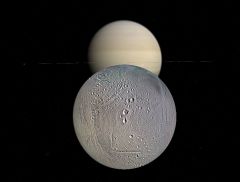
| |
| Enceladus in Orbiter 2016 with D3D9 client with Saturn in the background | |
| Designation | |
| Name | Enceladus |
| Reference body | Saturn |
| Planetary mean orbits | |
| Epoch | 2005.41409993155 |
| Semimajor axis (a) | 238408052.167797 m |
| Eccentricity (e) | 0.000372459385461708 |
| Inclination (i) | 28.04279097° (0.489439033839462 radian) |
| Longitude of the ascending node (LAN, ☊) | 169.5204865° (2.95869063964615 radian) |
| Longitude of periapsis (ϖ) | 264.6781976° (4.6195060071305 radian) |
| Mean longitude (L) | 384.1198896° (6.70415679611494 radian) |
| Selected physical parameters | |
| Mean radius | 249000 km |
| Mass | 7.30×1019 kg |
| Rotation elements | |
| SidRotPeriod | 118454 seconds (32.9 hours) |
| SidRotOffset | 0 |
| Obliqutiy | 0.4895 |
| LAN | 6.09808 |
| Note | *Elements given are from Enceladus.cfg (Orbiter 2005) |
Enceladus is sixth largest moon of Saturn, and the nineteenth largest moon in the Solar System, about 500 km diameter, about a tenth the diameter of Titan. It was discovered by William Herschel on 28 August 1789. Enceladus has been imaged by Voyagers 1 and 2 and by the Cassini mission.
Enceladus in Orbiter
Enceladus was introduced by the release of Orbiter 2002.
Orbiter versions and add-ons which include Enceladus.
| Add-on | Source | Version | Author | Type | Release Date | Compatibility | Wiki article |
|---|---|---|---|---|---|---|---|
| 2005 (with P1 patch files) | O-F Resources | 050216 | martins | Orbiter Download | 16 February 2005 | Orbiter 2005 | |
| Orbiter 2003-P2 | O-F Resources | 031217 | martins | Orbiter Download | 17 December 2003 | Orbiter 2003-P2 | |
| Orbiter 2003-P1 | O-F Resources | 031105 | martins | Orbiter Download | 5 November 2003 | ||
| Moons of Saturn Part 3 | AVSIM | Rolf Keibel | Scenery | 19 October 2002 | |||
| Orbiter 2002 | O-F Resources | 020419 | martins | Orbiter Download | 19 April 2002 | Orbiter 2002 | |
See also
| edit The Solar System | |
|---|---|
| Central star |
Sun (Sol) |
| Planets |
Mercury - Venus - Earth - Mars - Jupiter - Saturn - Uranus - Neptune |
| Natural satellites |
Moon - Phobos - Deimos - Io - Europa - Ganymede - Titan - more... |
| Add-ons |
Planets - Dwarf Planets - Small objects - Natural satellites - Alternative star systems |
 | This natural satellite related article is a stub. You can help Orbiterwiki by expanding it. |
